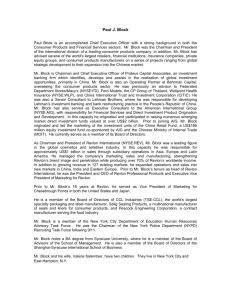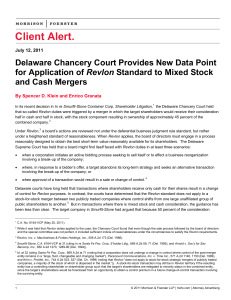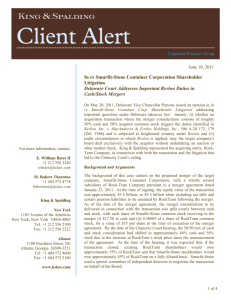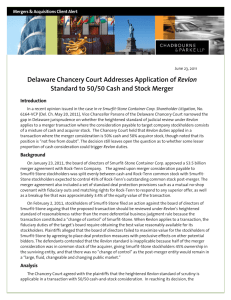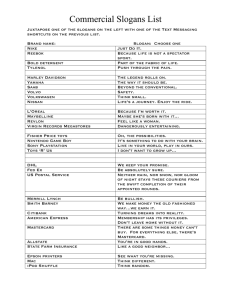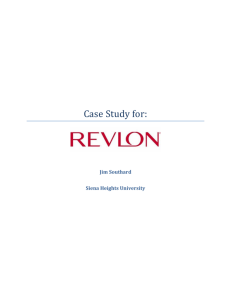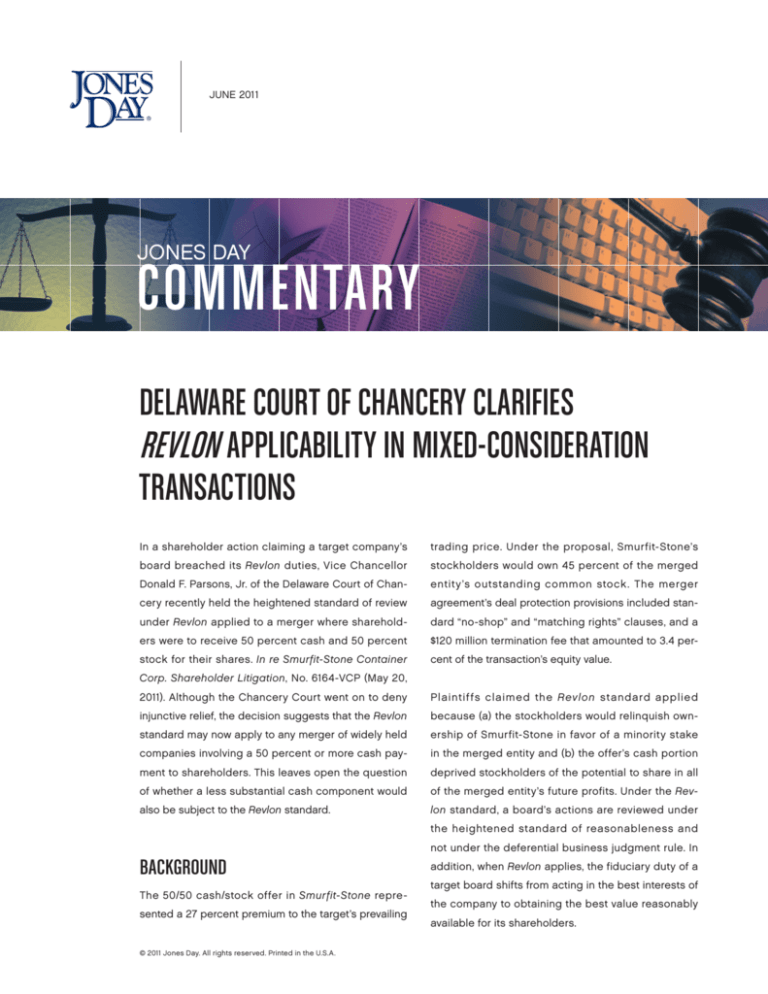
JUNE 2011
JONES DAY
COMMENTARY
DELAWARE COURT OF CHANCERY CLARIFIES
REVLON APPLICABILITY IN MIXED-CONSIDERATION
TRANSACTIONS
In a shareholder action claiming a target company’s
trading price. Under the proposal, Smurfit-Stone’s
board breached its Revlon duties, Vice Chancellor
stockholders would own 45 percent of the merged
Donald F. Parsons, Jr. of the Delaware Court of Chan-
entity’s outstanding common stock. The merger
cery recently held the heightened standard of review
agreement’s deal protection provisions included stan-
under Revlon applied to a merger where sharehold-
dard “no-shop” and “matching rights” clauses, and a
ers were to receive 50 percent cash and 50 percent
$120 million termination fee that amounted to 3.4 per-
stock for their shares. In re Smurfit-Stone Container
cent of the transaction’s equity value.
Corp. Shareholder Litigation, No. 6164-VCP (May 20,
2011). Although the Chancery Court went on to deny
Plaintif fs claimed the Revlon standard applied
injunctive relief, the decision suggests that the Revlon
because (a) the stockholders would relinquish own-
standard may now apply to any merger of widely held
ership of Smurfit-Stone in favor of a minority stake
companies involving a 50 percent or more cash pay-
in the merged entity and (b) the offer’s cash portion
ment to shareholders. This leaves open the question
deprived stockholders of the potential to share in all
of whether a less substantial cash component would
of the merged entity’s future profits. Under the Rev-
also be subject to the Revlon standard.
lon standard, a board’s actions are reviewed under
the heightened standard of reasonableness and
not under the deferential business judgment rule. In
BACKGROUND
The 50/50 cash/stock offer in Smurfit-Stone represented a 27 percent premium to the target’s prevailing
© 2011 Jones Day. All rights reserved. Printed in the U.S.A.
addition, when Revlon applies, the fiduciary duty of a
target board shifts from acting in the best interests of
the company to obtaining the best value reasonably
available for its shareholders.
The shareholders also asserted that the Smurfit-Stone direc-
cash deal, which was subject to Revlon, than to the Santa
tors breached their Revlon duties by failing to inform them-
Fe 33 percent transaction, which was not. Still, the court
selves adequately about the market, agreeing to restrictive
acknowledged that its “conclusion that Revlon applies is not
deal protection provisions, permitting members of the
free from doubt.”
Smurfit-Stone management with conflicting interests to
participate in the negotiations, relying on an inexperienced
Applying the Revlon standard to the facts before it, the court
financial advisor, and accepting an inadequate price.
concluded that the Smurfit-Stone board had not breached
its duties because it had been adequately informed about
the market, the deal protection clauses did not have a pre-
THE DECISION
clusive effect, the board acted appropriately throughout the
merger process, and the plaintiffs had not shown that the
As Vice Chancellor Parsons noted, a pure stock-for-stock
price was inadequate. After finding as well that the plaintiffs
merger does not trigger the Revlon standard when the own-
did not face irreparable harm and that there was a danger
ership shifts from one large unaffiliated group of public
that the stockholders could lose out on the deal altogether,
shareholders to another because there is no change of con-
the court denied the request for a preliminary injunction.
trol. In an all-stock transaction of this type where there is no
resulting majority shareholder, the target’s stockholders are
As a result of Smurfit-Stone, and notwithstanding the criti-
not relegated to minority status and are able to participate
cism of some commentators that the analysis ignores prior
fully in any future success of the company and any future
Delaware decisions finding that Revlon should be inappli-
control premium should the company be acquired later. Rev-
cable when control of the combined entity remains in the
lon does apply, however, when stockholders receive only
hands of a fluid public market, it appears that a 50 percent
cash because they are foreclosed from deriving any benefit
or more cash transaction may now trigger the Revlon stan-
from the merged entity’s future profits and will never obtain
dard of review. Although there have been no Delaware cases
a control premium in a subsequent transaction. Under set-
addressing the issue of whether Revlon applies to trans-
tled Delaware law, however, Revlon is not triggered simply
actions with a 34 percent to 49 percent cash component,
because the transaction includes some cash. In 1995, the
the absence of any logical rationale for triggering Revlon at
Delaware Supreme Court ruled that Revlon did not apply to
levels between 33 percent and 50 percent suggests that,
a 33 percent cash transaction. In re Santa Fe Pacific Corp.
if Smurfit-Stone remains good law, a 50 percent cash pro-
Shareholder Litigation, 669 A.2d 59, 64-65, 71 (Del. 1995).
portion may ultimately be the minimum at which Revlon is
triggered. Given the uncertainty in this area, however, we
Acknowledging that it is unclear precisely when a mixed
expect that practitioners will continue to advise that a trans-
stock-and-cash merger triggers Revlon, Vice Chancellor
action could be subject to Revlon unless the cash portion is
Parsons held that Revlon did apply to a 50 percent cash
33 percent or less and no other Revlon factors apply.
transaction. Noting that in In re Lukens Inc. Shareholders
Litigation, 757 A.2d 720, 732 (Del. Ch. 1999), then-Vice Chancellor Stephen P. Lamb held that Revlon applied where 62
percent of the transaction was in cash, Vice Chancellor Par-
OTHER MATTERS
sons stated that in a 50 percent cash transaction, there is
The decision also provides useful perspectives on a target
similarly “no tomorrow” for the cash received by a target’s
company’s shareholder duties in face of a merger offer. In
shareholders. The Smurfit-Stone court went on to hold that
rejecting the injunction, the court addressed a variety of
Revlon standards did apply, even in the absence of a con-
the plaintiffs’ claims for fiduciary breach and, among other
trolling shareholder in the new entity, because (a) the 50
things:
percent portion of the stockholders’ investment that was
to be cashed out was substantial, and (b) the transaction
• The court reiterated that a target company has no spe-
in question was marginally closer to the Lukens 62 percent
cific duty to employ an auction or market check in a
2
transaction subject to Revlon, nor any legal obligation
Robert S. Faxon
to run a post-signing “go-shop” process in situations in
Cleveland
which there is not a pre-signing market check.
+1.216.586.7104
• Although the court did not address the decision to form
a special committee in response to potential management conflicts resulting from contractual officer payouts
triggered by the transaction, this likely was a significant
factor in the court’s rejection of plaintiffs’ argument that
management was too heavily compromised to participate
in the sales process.
These are important reminders that the analysis will, and
should, be driven by the facts and circumstances of the situ-
rfaxon@jonesday.com
Scott Fletcher
Houston
+1.832.239.3846
sfletcher@jonesday.com
Lyle G. Ganske
Cleveland
+1.216.586.7264
lganske@jonesday.com
ation, with a board’s transaction process being the key.
Andrew M. Levine
You can download a copy of the full Smurfit-Stone opinion
New York
by clicking here.
+1.212.326.8319
amlevine@jonesday.com
LAWYER CONTACTS
Robert C. Micheletto
New York
For further information, please contact your principal Firm
+1.212.326.3690
representative or the lawyers listed below. General email
rmicheletto@jonesday.com
messages may be sent using our “Contact Us” form, which
can be found at www.jonesday.com.
Robert A. Profusek
New York
Louis A. Chaiten
Cleveland
+1.216.586.7244
lachaiten@jonesday.com
James P. Dougherty
Cleveland
+1.212.326.3800
raprofusek@jonesday.com
Geoffrey J. Ritts
Cleveland
+1.216.586.7065
gjritts@jonesday.com
+1.216.586.7302
jpdougherty@jonesday.com
Philip Le B. Douglas
New York
+1.212.326.3611
pldouglas@jonesday.com
Jones Day publications should not be construed as legal advice on any specific facts or circumstances. The contents are intended for general
information purposes only and may not be quoted or referred to in any other publication or proceeding without the prior written consent of the
Firm, to be given or withheld at our discretion. To request reprint permission for any of our publications, please use our “Contact Us” form, which
can be found on our web site at www.jonesday.com. The mailing of this publication is not intended to create, and receipt of it does not constitute,
an attorney-client relationship. The views set forth herein are the personal views of the authors and do not necessarily reflect those of the Firm.



